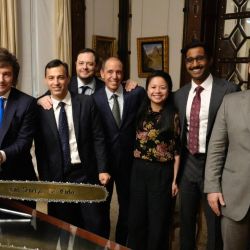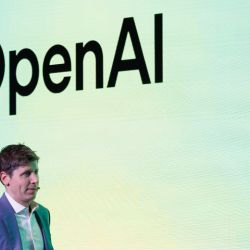US tech company OpenAI, the creator of ChatGPT, has signed a letter of intent to build a massive artificial intelligence data centre in Argentina’s Patagonia region – the first of its kind in Latin America.
The Stargate Argentina project, announced by Argentina’s government on Friday, will involve a partnership with domestic firm Sur Energy and entail an investment of some US$25 billion, according to a statement.
The initiative will be structured under Milei’s “Régimen de Incentivos para Grandes Inversiones” incentive scheme for major investments – better known as RIGI – which offers 30-year fiscal and customs benefits to attract foreign capital to strategic sectors.
According to the government statement, the project will be developed through a joint venture between Sur Energy and a leading global cloud infrastructure provider, with OpenAI participating as the main buyer of computing capacity.
News of the agreement came after a meeting on Friday between President Javier Milei, top officials and senior executives from OpenAI and Sur Energy.
Also in attendance was Demian Reidel, an advisor to Milei and president of state-run Nucleoeléctrica Argentina SA, which the government intends to part-privatise.
Milei’s office said the meeting “reflects OpenAI’s interest in investing in technological infrastructure to expand the global reach of artificial intelligence, in line with Argentina’s plans to establish itself as a sustainable innovation hub.”
No details were provided on the project’s exact location or start date.
‘Next generation’
The Stargate Argentina data centre will be built on a scale “capable of hosting the next generation of AI computing and reaching a capacity of up to 500 MW,” said Argentina’s government.
It will be the first Stargate project in Latin America and is designed to drive AI-powered growth while generating economic and social benefits, as well as equitable access to transformative technologies.
“This is our first Stargate project in Latin America, a region full of talent, creativity and ambition. This milestone is about more than just infrastructure. It’s about putting AI into the hands of people across Argentina,” OpenAI chief executive Sam Altman said in a video message.
“We’re excited to be working with Argentina as it becomes an AI hub for all of Latin America,” he continued.
“When I first met President Milei during his visit to San Francisco last year, his vision for how AI can drive Argentina’s growth and creativity was unmistakable and strong. Stargate Argentina will help bring that vision to life,” said Altman.
Sur Energy, founded by Argentine entrepreneurs, will act as the energy and infrastructure leader for the project. The firm will lead implementation to ensure the data centre ecosystem is powered by secure, efficient and sustainable sources, according to the government.
“This project represents a historic opportunity for the country,” said Sur Energy partner Emiliano Kargieman in a press release. “It combines Argentina’s unique renewable energy potential with the development of critical infrastructure for global artificial intelligence.”
He continued: “This alliance positions Argentina as a key player in the new digital and energy map, creating high-quality jobs, attracting international investment and showing that innovation and energy can be complementary drivers of sustainable development.”
OpenAI access
The partnership will also expand access to OpenAI technology across Argentina through the “OpenAI for Countries” initiative, starting with government agencies.
The programme will help public employees, administrators and research institutions use AI to streamline their work, reduce costs and improve public services.
OpenAI has previously hinted at its Stargate initiative, which involves an estimated US$500 billion in global investments to develop a worldwide network of next-generation data centres.
Altman, speaking in May, said OpenAI would partner with national governments to improve data centre capacity, as well as assist counties to customise the firm's products for specific languages and local needs.
In a recent interview with AFP, OpenAI’s number two, Fidji Simo, rejected suggestions that such monumental spending on AI infrastructure could turn into a bubble, describing it instead as “the new reality” required to meet growing user demand.
“This is a massive investment in computing power at a time when we are desperately short of it for many of the applications people want,” Simo said.
“I think the world is really going to change and realise that computing power is the most strategic resource,” she added.
– TIMES/AFP/NA



























Comments